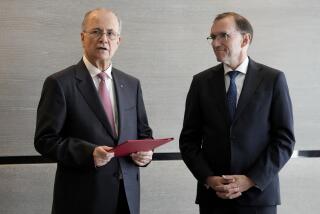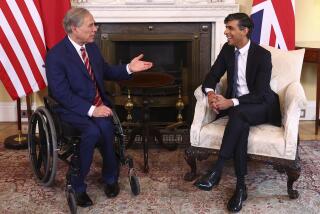British Parliament OKs Role for Ireland in Ulster
- Share via
LONDON — By an overwhelming majority, the British Parliament on Wednesday night ratified a milestone agreement between Britain with the Republic of Ireland that commits the two countries to joining forces to promote peace in violence-plagued Northern Ireland.
The 473-47 vote put the accord into effect immediately, and the first meeting of a controversial Anglo-Irish Intergovernmental Council is expected to take place within the next few weeks. The Irish Parliament ratified the agreement last week.
Two of the 15 Protestant members of Parliament representing Northern Ireland immediately submitted resignations, effective Jan. 1, in protest against the vote. A spokesmen said the 13 others will also resign their seats before the end of the year and turn their reelection campaigns into a de facto referendum on the agreement.
Under terms of the agreement, the Irish Republic will be permitted to put forward proposals and views on a broad range of issues in the province, also known as Ulster, but all decision-making remains with Britain.
Confidence-Building Measure
The aim of the accord is to give moderate Catholics in the province greater confidence in the government in order to isolate militant extremists, such as those of the outlawed Irish Republican Army, who have waged a violent campaign to force British withdrawal. The IRA and other nationalists want the province to be united with the Irish Republic.
Although the accord marks the first time the republic has formally accepted the British presence in Ulster, the majority Protestants see the Irish consultative role as a dilution of British sovereignty. They fear it is the first step toward a Catholic Ireland.
Their representatives have bitterly opposed the deal, and a rally last Saturday in the provincial capital, Belfast, drew tens of thousands of Protestants in what was one of the largest demonstrations in Ulster’s history.
The Ulster Protestant leader, the Rev. Ian Paisley, whose supporters physically assaulted Britain’s secretary of state for Northern Ireland, Tom King, last week in Belfast during a demonstration against the accord, Wednesday repeated his opposition to the agreement but said the campaign would be peaceful.
‘No Civil Commotion’
“There is to be no rioting on the streets and there is to be no civil commotion,” he said. “We are going to use democratic principles.”
Protestant political leaders have promised a campaign of non-cooperation but have hinted at the possibility of violence if it doesn’t succeed.
While there is little doubt a majority of Protestants oppose the agreement, it remains unclear how far they are willing to go to bring it down.
With unemployment running at more than 20% and the province weary from the sectarian violence that has claimed about 2,500 lives in the last 16 years, some political observers believe that enthusiasm for fighting the agreement could dwindle quickly.
Others, however, note that twice previously in this century, Protestant protests have torpedoed diplomatic efforts at reconciliation.
Fears Called Exaggerated
Summing up two days of debate, King said Protestant fears were exaggerated and misplaced. “This agreement does offer the prospect for better security and of a return to greater stability,” he said.
Prime Minister Margaret Thatcher, who spoke Tuesday on the issue, said the agreement was aimed at reconciling Protestants and Catholics in the province.
Neil Kinnock, leader of the opposition Labor Party, backed the agreement as did leaders of the Liberal and Social Democratic parties.
The United States is expected to support the accord by offering between $250 million and $500 million in economic development funds for Northern Ireland. The U.S. ambassador to Britain, Charles H. Price, said Tuesday that if Congress approved the aid package, it would most likely be channeled into investments that would bring more jobs to the province.
More to Read
Sign up for Essential California
The most important California stories and recommendations in your inbox every morning.
You may occasionally receive promotional content from the Los Angeles Times.













